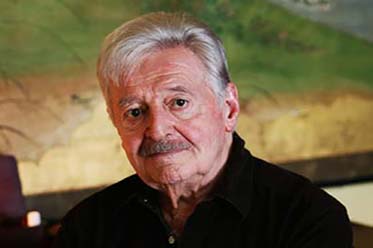 Internationally renowned Australian composer Peter Sculthorpe, whose work was shaped by his love of the Australian landscape, has died aged 85. Over six decades of a rich musical career, Sculthorpe changed Australia’s music landscape forever, with a catalogue consisting of more than 350 pieces ranging from solos to orchestral works and opera.
Internationally renowned Australian composer Peter Sculthorpe, whose work was shaped by his love of the Australian landscape, has died aged 85. Over six decades of a rich musical career, Sculthorpe changed Australia’s music landscape forever, with a catalogue consisting of more than 350 pieces ranging from solos to orchestral works and opera.
Born in Launceston, Tasmania, in 1929, Sculthorpe was educated at Launceston Church Grammar School, the University of Melbourne, and Wadham College, Oxford. He is an Emeritus Professor at the University of Sydney, where he began teaching in 1964. He was a Harkness Fellow at Yale University, USA, in 1966, and a visiting professor at Sussex University, UK, in 1971-72. He has taught at universities within and outside Australia, and he holds honorary doctorates from the universities of Sydney, Tasmania, Melbourne, Sussex and Griffith.
Since 1965, Sculthorpe’s music had been published internationally by Faber Music. His catalogue of compositions consists of well over 350 works. His compositions are regularly performed and recorded throughout the world. He has written in most musical forms and his output relates closely to the unique social climate and physical characteristics of Australia, and to the cultures of its Pacific Basin neighbours.
His geographical outlook as an Australian caused him to be influenced by much of the music of Asia, especially during the 1960s by that of Japan and Indonesia. In recent years his music has become more deeply influenced by the Australian Aboriginal and Torres Strait Island music and culture in which he has taken an active interest since his teenage years.
Sculthorpe has a deep love for his country and its landscape, which he regards as sacred. One of the most constant themes in his output is the protection of Australia’s environment, as well as that of the whole planet. His preoccupation, too, with the frailty of the human condition can be heard in works such as Earth Cry (1986) and the choral Requiem (2004), His String Quartet No 16 (2006) grew from his concern about women and children killed in the war in Iraq, the latter from the plight of asylum-seekers in Australian detention.
The recipient of many awards, Sculthorpe regards the most significant as being chosen as one of Australia’s 100 Living Treasures (National Trust of Australia, 1997), Distinguished Artist 2001 (International Society for the Performing Arts), Honorary Foreign Life Member (American Academy of Arts and Letters, 2003) and one of the 100 Most Influential Australians (The Bulletin, 2006).
In 1977, Sculthorpe was appointed an Officer of the Order of the British Empire (OBE) and was recipient of a Silver Jubilee Medal. He was appointed an Officer of the Order of Australia (AO) in 1990, and in 2001, was awarded the Centenary Medal for his outstanding service to musical composition in Australia.
Image: Peter Sculthorpe – photo by Bridget Elliot
